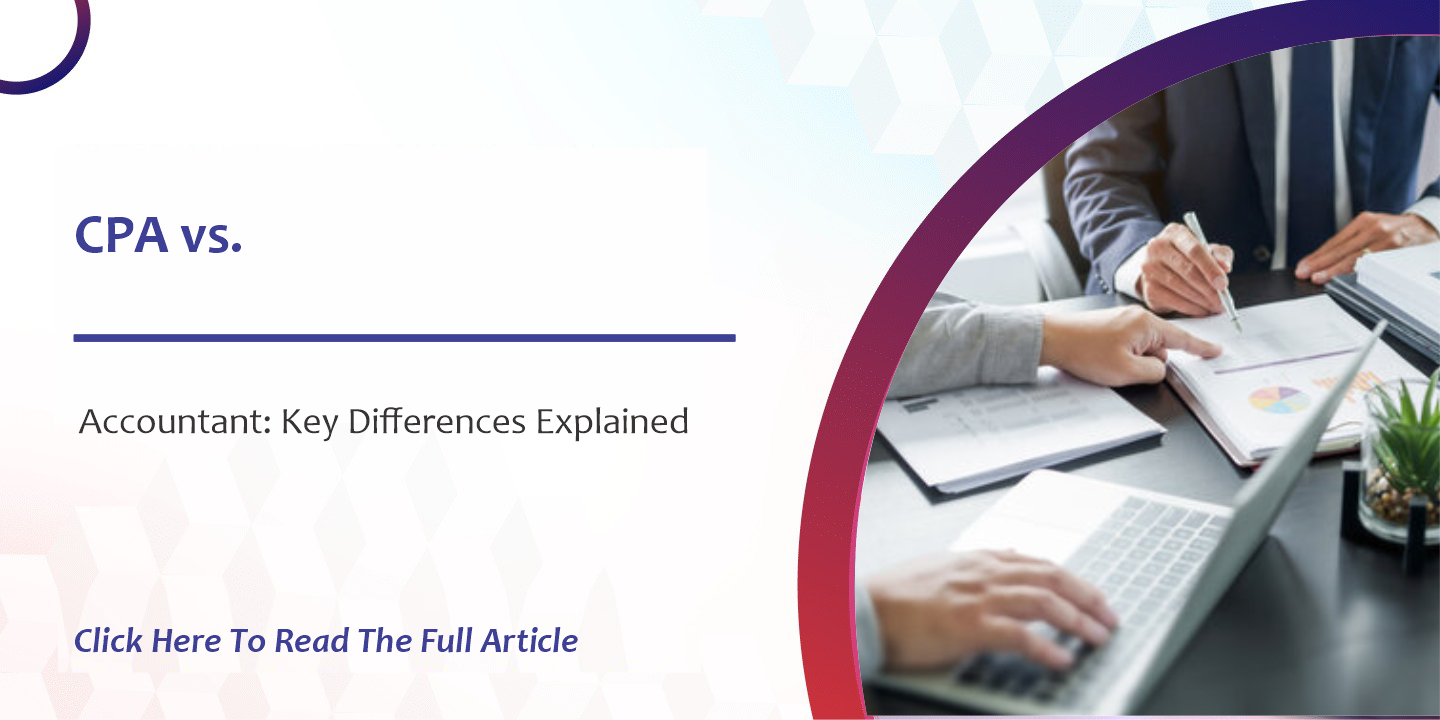When managing finances, whether for personal or business purposes, the terms CPA and accountant often come up. While both professionals work in the field of accounting, their roles, qualifications, and responsibilities are quite different. Understanding these differences is essential for individuals and businesses looking to hire the right professional for their specific financial needs.
This article will explore the key distinctions between CPAs and accountants, helping you determine which professional is best suited for your requirements.

What is a CPA (Certified Public Accountant)?
A CPA is a highly trained financial professional who has met specific education, examination, and work experience requirements. CPAs are licensed by state boards and are held to strict ethical and professional standards.
- Definition: A CPA is a licensed accounting professional who has passed the CPA exam and met state-specific requirements.
- Requirements: To become a CPA, one must complete a bachelor’s degree, pass the Uniform CPA Examination, and fulfill a specific amount of work experience.
- Certification: CPAs receive certification from their state’s board of accountancy, ensuring they meet the highest standards of accounting expertise.
What is an Accountant?
An accountant is a professional who records and analyzes financial transactions, prepares financial statements, and assists with tax filings. Unlike CPAs, accountants do not need a license to practice, but they may obtain various certifications to enhance their expertise.
- Definition: An accountant is a financial professional who manages financial data and provides financial insights.
- Qualifications: While some accountants hold degrees in accounting or finance, others gain experience through on-the-job training.
- Accounting Profession: Accountants work in various industries, offering essential financial services to businesses and individuals.
Educational Requirements
Educational Path for CPAs
The path to becoming a CPA is rigorous and requires a formal education in accounting.
- Bachelor’s Degree: Candidates must complete a bachelor’s degree in accounting, finance, or a related field.
- 150 Semester Hours: Most states require an additional 30 credit hours beyond a bachelor’s degree.
- Uniform CPA Exam: A challenging four-part examination that tests knowledge in auditing, business concepts, financial accounting, and regulation.
- Work Experience: CPAs must also complete a certain number of supervised work hours, typically in public accounting.
Educational Path for Accountants
Unlike CPAs, accountants do not have specific state licensing requirements but often have formal education in accounting or finance.
- Bachelor’s Degree (Optional): Many accountants earn a degree in accounting, though it is not mandatory.
- Certifications: Accountants can obtain certifications such as Certified Management Accountant (CMA) or Certified Bookkeeper (CB) to enhance their credentials.

Licensing and Regulation
CPA Licensing Process
CPAs are subject to strict regulations and must maintain their licenses through continuing education.
- State Board of Accountancy: Each state has its licensing board that oversees CPA requirements.
- Continuing Education: CPAs must complete ongoing professional education to maintain their certification.
Accountant Regulation
While accountants are not required to have a license, they may pursue voluntary certifications.
- Certifications Available: Certifications like CMA and CFA enhance an accountant’s expertise.
- Regulatory Bodies: Organizations such as the American Institute of CPAs (AICPA) provide guidelines for ethical accounting practices.
Scope of Work
CPA Responsibilities
CPAs have a broader range of responsibilities due to their licensing and expertise. Their services include:
- Tax Preparation & Filing: Handling complex tax returns and ensuring compliance with tax laws.
- Auditing & Assurance Services: Examining financial statements for accuracy and regulatory compliance.
- Financial Consulting: Providing strategic advice on investments, business growth, and risk management.
Accountant Responsibilities
Accountants focus on managing financial records and assisting with everyday financial tasks.
- Bookkeeping: Recording financial transactions and maintaining financial ledgers.
- Financial Reporting: Preparing income statements, balance sheets, and cash flow statements.
- Basic Tax Services: Assisting with personal and small business tax preparation.
Specializations and Expertise
CPA Specializations
CPAs often specialize in specific areas of accounting, such as:
- Taxation: Providing expert tax planning and compliance services.
- Auditing: Conducting independent audits for businesses and organizations.
- Forensic Accounting: Investigating financial fraud and irregularities.

Accountant Specializations
Accountants may also specialize in various areas, including:
- Cost Accounting: Helping businesses manage and reduce costs.
- Managerial Accounting: Providing financial analysis for business decision-making.
- Payroll Accounting: Managing employee compensation and payroll taxes.
Ethical Standards
CPA Ethical Standards
CPAs must adhere to strict ethical guidelines, including:
- AICPA Code of Professional Conduct: Ensuring integrity, objectivity, and professional competence.
- State Board Regulations: Following state-mandated ethical and professional standards.
Accountant Ethical Considerations
Accountants, while not licensed, still follow ethical principles such as:
- Confidentiality: Maintaining the privacy of financial records.
- Honesty and Accuracy: Ensuring financial statements are accurate and truthful.
Cost and Value
Cost of Hiring a CPA
CPAs charge higher fees due to their extensive training and expertise.
- CPA Fees: Range from hundreds to thousands of dollars depending on the service.
- Value of a CPA: Ideal for businesses needing advanced financial planning and tax strategies.
Cost of Hiring an Accountant
Accountants are generally more affordable and suitable for basic financial needs.
- Accountant Fees: Lower cost compared to CPAs.
- Value of an Accountant: Best for small businesses and individuals needing routine accounting support.

When to Choose a CPA vs. an Accountant
When to Hire a CPA
- You need tax planning or IRS representation.
- Your business requires financial auditing or compliance reporting.
- You need expert financial consulting for business growth.
When to Hire an Accountant
- You need basic bookkeeping and financial management.
- Your tax situation is simple and straightforward.
- You require regular financial reporting without complex analysis.
FAQs
1. What is the main difference between a CPA and an accountant?
A CPA (Certified Public Accountant) is a licensed professional with specialized training, while an accountant is a financial professional who manages financial records and reports but does not require certification.
2. Do I need a CPA or an accountant for my business?
It depends on your needs. If you require tax planning, audits, or complex financial consulting, a CPA is the best choice. For bookkeeping and general financial management, an accountant is sufficient.
3. Can an accountant do tax returns like a CPA?
Yes, accountants can prepare tax returns, but CPAs have more expertise in tax planning and can represent clients before the IRS.
4. How much does it cost to hire a CPA vs. an accountant?
CPAs typically charge higher fees due to their licensing and expertise, while accountants offer more affordable rates for general financial services.
5. Do all accountants have a degree in accounting?
No, while many accountants have a degree in accounting or finance, others gain experience through on-the-job training or certifications.
6. Can an accountant become a CPA?
Yes, an accountant can become a CPA by meeting the required education, passing the CPA exam, and completing relevant work experience.
7. What services can a CPA provide that an accountant cannot?
CPAs can provide auditing, forensic accounting, IRS representation, and advanced tax planning, which accountants are not authorized to perform.
8. Are CPAs required to continue their education?
Yes, CPAs must complete continuing professional education (CPE) to maintain their license and stay updated on industry changes.
9. Can I hire an accountant instead of a CPA for my small business?
Yes, if your business requires bookkeeping, payroll management, and basic tax services, an accountant is a cost-effective choice.
10. How do I choose between a CPA and an accountant?
Consider your financial needs—if you require expert financial advice, tax strategies, or compliance audits, hire a CPA. For routine financial tasks, an accountant is sufficient.
Conclusion
Both CPAs and accountants play crucial roles in financial management, but their qualifications, responsibilities, and expertise differ significantly. CPAs are licensed professionals who offer advanced financial services, while accountants provide essential financial management services at a lower cost. The choice between hiring a CPA or an accountant depends on the complexity of your financial needs.
Evaluate your financial situation and consult with a qualified professional to ensure you get the right level of expertise for your needs.


